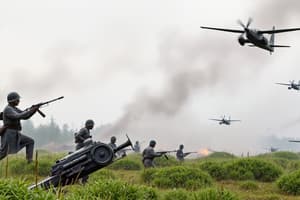Podcast
Questions and Answers
What was World War II?
What was World War II?
More than 50 countries took part in the war, with battles occurring on nearly every continent except Antarctica.
What event is considered the beginning of World War II?
What event is considered the beginning of World War II?
The German invasion of Poland on September 1, 1939.
Which of the following were the major powers involved in World War II?
Which of the following were the major powers involved in World War II?
- The Axis Powers (correct)
- The United Nations
- The Allies (correct)
- The Central Powers
What countries were the principal members of the Axis Powers?
What countries were the principal members of the Axis Powers?
Who were the main leaders of the Axis Powers?
Who were the main leaders of the Axis Powers?
Who were the major Allied Powers?
Who were the major Allied Powers?
What aggressive action did Hitler take in 1939?
What aggressive action did Hitler take in 1939?
What was the new kind of warfare introduced in WWII?
What was the new kind of warfare introduced in WWII?
What event led to the United States entering World War II?
What event led to the United States entering World War II?
What impact did the atomic bomb have on World War II?
What impact did the atomic bomb have on World War II?
What was a major turning point battle of WWII?
What was a major turning point battle of WWII?
What was the result of the Battle of Britain?
What was the result of the Battle of Britain?
How many soldiers were injured in World War II?
How many soldiers were injured in World War II?
How many Jews died in the Holocaust?
How many Jews died in the Holocaust?
What were the Nuremberg Trials?
What were the Nuremberg Trials?
What did the indictments at the Nuremberg Trials include?
What did the indictments at the Nuremberg Trials include?
What was the outcome for most defendants in the Nuremberg Trials?
What was the outcome for most defendants in the Nuremberg Trials?
Flashcards are hidden until you start studying
Study Notes
World War II Overview
- Involved over 50 countries, fighting across all continents except Antarctica.
- Key battlegrounds included Asia, Europe, North Africa, and the oceans.
Beginning of WWII
- Often marked by Germany's invasion of Poland on September 1, 1939.
- Led to the decline of Western Europe’s global power and the rise of the U.S.S.R.
- Set the stage for the Cold War and the nuclear era.
Major Powers Involved
- Primary coalitions: Axis Powers and Allies.
Axis Powers
- Major countries: Germany, Italy, Japan.
- Signed the Tripartite Pact in 1940 for mutual defense against American attacks.
- Included Hungary, Bulgaria, and Romania as allies.
Leaders of the Axis Powers
- Adolf Hitler (Germany), Benito Mussolini (Italy), Hideki Tojo (Japan).
The Allies
- Consisted of nations fighting against the Axis Powers.
- Major powers included the United States, Soviet Union, Great Britain, France, and China.
Major Leaders of the Allies
- Key figures: Winston Churchill (Britain), Franklin D. Roosevelt (U.S.), Joseph Stalin (Russia).
Axis Powers and Aggression
- Germany's discontent with the Treaty of Versailles prompted aggression.
- Hitler sought territorial expansion, leading to the attack on Poland and subsequent declarations of war by Britain and France.
A New Kind of War
- Utilized modern warfare technology (tanks, trucks, bombers) for rapid movement.
- Blitzkrieg ("lightning war") strategy resulted in quick victories, beginning with Poland.
America Enters the War
- Japan's attack on Pearl Harbor on December 7, 1941, prompted U.S. entry into WWII.
- U.S. forces engaged in multiple theaters of war across Europe and the Pacific.
The Atomic Bomb
- The U.S. dropped atomic bombs on Hiroshima and Nagasaki in August 1945.
- Prompted Japan's surrender, effectively ending the war.
Major Battles of WWII
- Battle of Britain: The Royal Air Force defended against Germany's aerial attacks aiming to prepare for invasion.
- Pearl Harbor: A surprise attack by Japan leading to U.S. involvement in the war.
- Battle of Stalingrad: A pivotal and devastating battle, marking a strengthening of Allied positions after a significant German defeat.
- D-Day (Invasion of Normandy): On June 6, 1944, Allied forces launched a major attack on German-held territory in France, marking a turning point.
- Battle of the Bulge: Germany's last major offensive, marked by heavy U.S. troop involvement.
- Battle of Iwo Jima: Key U.S. victory in Japan, necessary for strategic air operations against the Japanese mainland.
Results of the War
- Over 34 million soldiers injured and 22 million died.
- Over 30 million civilians lost their lives, many due to the Holocaust.
The Holocaust
- Systematic genocide led by the Nazis, resulting in the deaths of 6 million Jews.
- Targeted various groups including Slavs, Catholics, homosexuals, and the disabled.
Nuremberg Trials
- Held by Allied forces to prosecute major Nazi leaders.
- Focused on crimes against humanity and war crimes.
- Trials took place in Nuremberg, Germany, from 1945-46.
Indictments and Convictions
- Indictments included conspiracy for crimes against peace, war crimes, and crimes against humanity.
- Out of 22 defendants, 19 were convicted, with varying sentences, including 12 sentenced to death.
Sentencing
- Three defendants acquitted; 19 convicted with sentences ranging from death to life imprisonment.
- Hermann Goering committed suicide prior to execution.
Studying That Suits You
Use AI to generate personalized quizzes and flashcards to suit your learning preferences.




